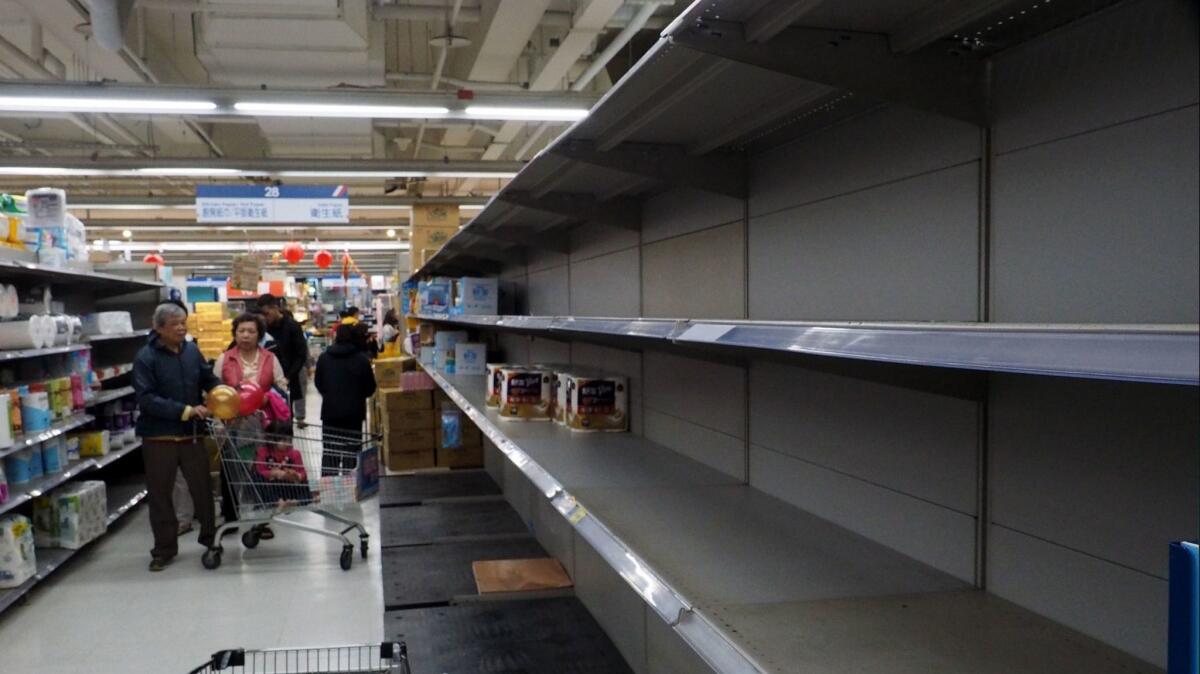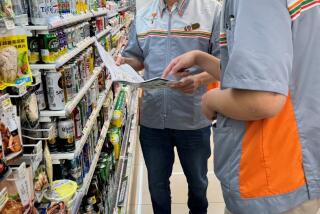Taiwan goes on a panic-buying spree — for toilet paper

- Share via
Reporting from TAIPEI, Taiwan — Taiwan is no stranger to panic buying. Taiwanese have lined up for gasoline for fear of price hikes and made a run for fresh produce ahead of rain that was forecast to damage crops and raise prices. They have lived through sudden shortages in milk and bottled water.
Now there’s a run on toilet paper in what’s being described as the worst panic-buying spree in nearly five decades.
Selena Lin checked a few convenience stores in the capital, Taipei, last week, but found the shelves empty. She was racing off to another store in hopes of finding bathroom tissue before another expected price hike.
“I think they shouldn’t raise prices, or they could give us some time to prepare. Don’t just tell us [of price hikes] all of a sudden,” said Lin, 35, an office manager at a private university. “Then not so many people would go grab it.”
The run on toilet paper started Feb. 23, when local media reported that major vendors would raise prices 10% to 30%. That meant plastic-wrapped super packs containing 10 to 12 smaller bags of tissue would go from the equivalent of $6.80 to as much as $8.90 in the worst cases. The vendors cited increases in wood pulp prices.
The island’s free-wheeling mass media show scenes of empty shelves and worried shoppers, giving viewers a sense of scarcity.
“The media are a mess,” said Taipei shopper Chiu Yuan-chao, who ordered a box of 500 tissue sacks in February. “It’s as if they’re helping the vendors to sell out supplies.”
Panic buying picked up in late February even as Taiwan’s Department of Consumer Protection said prices had not yet risen and that adequate supplies remained in stock, department deputy director Wu Cheng-hsueh said.
On March 8 he said Taiwan still had toilet paper supplies and that the worst panic buying was over. The government’s statements just fueled panic, said Liang Kuo-yuan, president of the Yuanta-Polaris Research Institute think tank in Taipei.
Some stores ran out of paper this week and last. Others stocked half their usual amounts.
Consumers are hypersensitive to price increases because of slow growth in their wages and patchy information about what to expect when things start costing more.
“Because they haven’t seen much income gain over the past few years and prices are going up, consumers are quite sensitive,” said Jerry Kuo, co-founder of the Taiwanese e-commerce firm Buy123.com.
Per-capita wages in Taiwan average $1,288 a month, roughly the same as in Mexico, according to 2016 figures from the Organization for Economic Cooperation and Development. Taiwanese employers sometimes keep wages lower than in other developed Asian economies so export prices stay competitive. They might otherwise move factories to countries where labor costs even less.
When toilet paper prices were set to rise, “lower- to middle-income people genuinely felt concerned,” Liang said.
“The toilet paper frenzy reflects the rise in public inflation expectations and consumers’ concerns about a loss in their purchasing power,” said Ma Tieying, an economist with DBS Bank in Singapore. Inflation forecast at 1% shows signs of going up now, she added.
Every day since Feb. 23, shoppers can be seen at any Taipei supermarket checkout stand with one or two super-packs of toilet paper — if the paper is in stock. Television images of people grabbing tissues off supermarket shelves fueled the panic, shoppers and sellers say.
“When people see images on television, they aren’t clear whether there’s a serious problem,” said Lee Cheng-che, a public relations manager with the 114-store Carrefour supermarket chain in Taiwan. “The media definitely have some power.”
Carrefour’s toilet paper sales by volume rose sixfold in the 10 days from Feb. 24 compared with the norm for that period, Lee said without specifying exact amounts. Some of the chain’s stores limited purchases to two bags per shopping trip, an average household’s monthly supply, to make sure some always stayed on the shelves, he said.
Kuo, of Buy123.com, said the firm sold more tissues over three days in late February than in the whole second half of 2017.
After reading reports online, “some people instantly said it was ridiculous, but some people said ‘panic,’ so people went to the markets to buy,” said Wu Yi-hsuan, a Taiwanese university research assistant who accompanied his mother in early March to buy toilet paper but found shelves empty.
Kimberly-Clark, the Texas-based vendor of the popular Shu-Chieh brand of toilet paper in Taiwan, has made sure that “production is running at full capacity and all stock is being sent to retailers,” a company spokesman said without giving sales figures since late February.
The company, which makes Scott and Cottonelle toilet tissue, among a variety of paper products in the U.S., cited the rising cost of pulp as one of “several factors” behind a proposed price hike, which would be Kimberly-Clark’s first such increase in Taiwan in about a decade. Low wood pulp inventories in Asia, especially in the massive China market, and strong regional demand had been forecast to bring higher pulp prices in 2018.
The rush for toilet paper marks Taiwan’s worst panic-buying incident since the global gasoline price hikes of the 1970s, Liang said. Cars lined up in the streets at filling stations a day or two ahead of gasoline price hikes announced by Taiwan’s two chief suppliers.
Scarcity has struck before. In August 2015, bottled water disappeared from store shelves in Taipei for half a week after the city’s tap water ran murky because of silt contamination caused by a typhoon. In 2009, a typhoon killed 373 cows and caused a shortage of fresh milk, pushing prices up for what little remained. Some stores limited purchases to one bottle of milk per customer.
When Taiwan’s Central Weather Bureau forecasts typhoons, which hit the island from June through October, some shoppers stock up on fruit and vegetables because crop damage from heavy rains can result in quick price increases.
Taiwanese consumers stockpile because they believe prices never turn back after going up. Prices of the prepackaged lunches common among Taipei office workers seldom fall, even after food production returns to normal after crop damage, consumers point out.
Jennings is a special correspondent.
More to Read
Sign up for Essential California
The most important California stories and recommendations in your inbox every morning.
You may occasionally receive promotional content from the Los Angeles Times.













